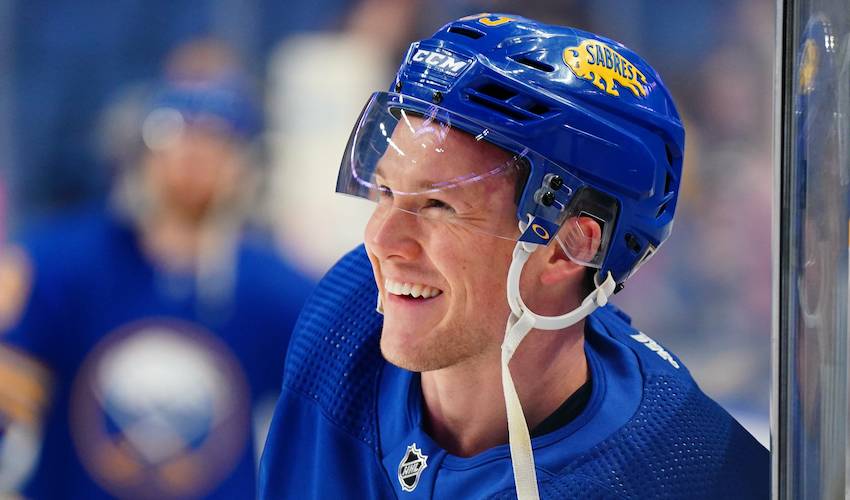The Buffalo Sabres recently announced the re-hiring of Lindy Ruff as their latest head coach, sparking discussions about his coaching approach during his reintroduction to the media and the city. Themes such as accountability, hard work, and consequences for subpar performance were highlighted. As Ruff addressed these topics, it prompted reflections on the current roster. With Don Granato removed from his coaching position, it became evident that he struggled to maximize player performance. Consequently, there is room for improvement among the players. With Ruff now at the helm, some individuals may thrive under his coaching style, while others may find it challenging to adapt.
Owen Power
Ruff has a proven history of enhancing the skills of strong defenders, suggesting significant potential for him to develop Owen Power into a more physically imposing and offensively adept defenseman. However, in the current scenario, Power’s performance last season revealed instances where his awareness on both offense and defense proved costly for his team. His speed remains a work in progress, and his physicality is notably lacking. Ruff is expected to demand more from Power, recognizing his untapped potential. Yet, if Power continues on the trajectory observed last season, he may find himself spending more time on the bench compared to his teammates.
-ep.jpg)
In his press conference, Ruff emphasized his intention to utilize ice time as a tool to both reward and discipline players according to their performances. Unlike Don Granato, who mainly applied this strategy to rookies and JJ Peterka, Power should expect to face Ruff’s benching policies if his performance warrants it. While this doesn’t guarantee Power’s failure under Ruff, it suggests that if his performance doesn’t improve from last season’s patterns, he may encounter challenges.
Peyton Krebs
This selection poses a challenge as there are both positive and negative aspects to consider. On one hand, Peyton Krebs might secure a more prominent role with the team if he manages to break through and start contributing offensively. However, if he continues to struggle to register points, it’s unlikely he’ll ascend the lineup in Ruff’s system. Under Granato’s coaching, Krebs received instruction on defensive play and developed skills as an agitator, with occasional opportunities to showcase his playmaking abilities. Similarly, under Ruff, he’ll have similar opportunities, but his advancement will ultimately hinge on his statistical output and tangible contributions.
-ep.jpg)
As Ruff highlighted in his press conference, he intends to reward players who perform well with increased ice time, and Krebs possesses the necessary attributes and mindset to potentially earn such favor. One crucial factor for the upcoming season, assuming Krebs remains with the team and isn’t traded, will be his linemates. Will he be paired with rookie Jiri Kulich on the third line? Perhaps Matt Savoie? Will Jeff Skinner be a regular fixture on his wing? Alternatively, could he find himself on the fourth line alongside Zemgus Girgensons and potentially a new free agent signing? There are numerous possibilities for how Krebs’ season could unfold, but if he fails to demonstrate his offensive capabilities, it’s unlikely he’ll thrive in Ruff’s system.
Jeff Skinner
The proverbial elephant in the room is Skinner’s precarious position, having fallen out of favor under one Sabres head coach and experiencing a decline in his lineup placement even towards the end of Granato’s tenure. Despite Skinner’s offensive prowess, his status in the top-6 is no longer assured due to the emergence of JJ Peterka, Jack Quinn, and the promising performances of Zach Benson. Under Ruff, being deployed on the third line will necessitate a greater emphasis on defensive responsibilities, an area where Skinner has struggled.

If Ruff opts to utilize Skinner primarily in an offensive capacity and limits his ice time to specific situations, there may still be opportunities for success. However, if Skinner is relegated to a third-line role in Ruff’s system, he is likely to encounter difficulties. Without a clear understanding of the roster composition for the upcoming season and how Ruff plans to deploy his players, it’s challenging to predict Skinner’s performance accurately. Nevertheless, if his role resembles that of the latter part of the previous season, it’s unlikely Skinner will see more than 12 minutes of ice time per game—an underwhelming prospect considering his $9-million cap hit.
Buffalo Sabres prospects could face challenges as well
Aside from the current roster players, there’s limited space to promote prospects, which could lead to challenges between the top prospects and Ruff. Jiri Kulich and Isak Rosen come to mind immediately, both of whom are somewhat one-dimensional at this stage in their careers and are working on improving their two-way game. While developing this aspect will ultimately benefit them in Ruff’s eyes, if they were to play under him now, they would likely find themselves buried deep in the lineup.
Moving beyond the top prospects, some lesser-known players may also struggle due to their play styles. Alex Kisakov and Victor Neuchev are primarily focused on scoring and have deficiencies in their defensive and physical play. Meanwhile, Vsevlod Komarov, a defenseman, tends to engage in more offensive plays than necessary. Although all three are still a ways from NHL readiness, if they remain with the Sabres long enough to play under Ruff, they’ll need to expand their skill sets beyond just scoring.
Ruff Can Get More Out of These Players
Ruff’s reputation as a demanding coach aligns well with the current needs of the team. If it entails addressing weaker aspects of the roster players’ performance while pushing the prospects to elevate their game, then I fully support it. Each mentioned player has the potential to excel under Ruff, but they must address certain areas of improvement in their games to realize that potential. As we anticipate a new season on the horizon, there’s much to consider, and these players have significant work ahead of them.


